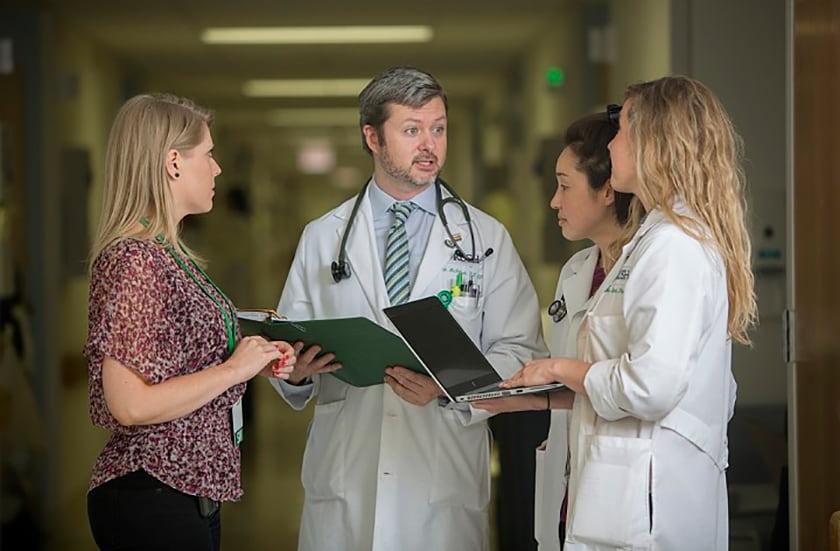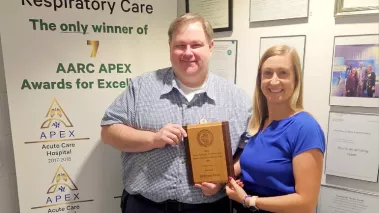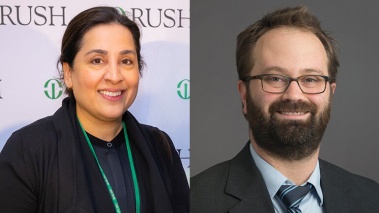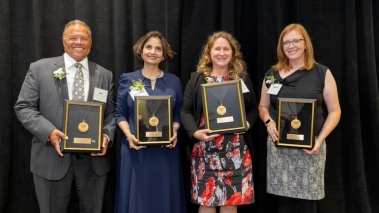As a gay man and a nurse practitioner at Rush University Medical Center, Erik McIntosh, MSN, RN, ACNP-BC, was surprised when his own primary-care physician neglected to discuss his current and past sexual experiences during an appointment. But when another medical colleague told him that as a minority he’d have to advocate for himself, he knew something had to change.
“It was striking to me that sexual behavior was not a standard discussion,” McIntosh says. “A patient goes to their provider for assistance in living the best, healthiest life they can. The mentality that patients should initiate conversations specific to their health is just backwards.”
All patients deserve welcoming, caring and equitable health care, regardless of their sexual orientation, gender identity or expression. Because even the most experienced and well-intentioned medical staff can succumb to cultural, religious or implicit personal bias, the lesbian, gay, bisexual, transgender, queer/questioning medical community is leading an effort to strive for enhanced sensitivity and better treatment for LGBTQ patients.
“Health care providers should realize that when working with LGBTQ individuals, like any individual, their identity can be complex and comes from a myriad of experiences that have shaped who they are at this moment,” McIntosh explains. “Providers should allow LGBTQ patients to share who they are, what they experience, what they do and what they believe without putting a label or an assumption on it.”
As part of his Doctorate in Nursing Practice training through Rush University’s College of Nursing, McIntosh chose to initiate an LGBTQ Healthcare Competency Program to study the lack of provider knowledge in this area and its subsequent effects on patient outcomes. He also works in conjunction with an in-house committee at Rush to conduct LGBTQ-focused educational sessions for the organization’s health care staff that touch on terminology and concepts, barriers and ways to more openly discuss patients’ sexuality and gender identity. The goal is to address the need for more specialized knowledge, greater preparedness, better behavior and improved attitudes regarding LGBTQ health at the provider level.
“I’ve encountered patients who ask me if I’m gay, I think because it’s a way for them to connect and feel safe in a system that hasn’t always treated them or a loved one justly,” McIntosh says. “Through this project, I’m hoping to create an environment to reflect, discuss and explore this topic.”
Nationally, LGBTQ patients have reported discrimination in the form of health care providers who refuse to touch them, use abusive language, blame them for their health status or are physically rough during examinations.
“There are still nurses who harbor anti-LGBTQ attitudes, which certainly affects the health and well-being of LGBTQ patients,” says Cecilia Hardacker, RN, MSN, CNL, director of education at Howard Brown Health. “When I talk to them, they quickly understand that there’s so much more they need to know. We let them off the hook for a minute, because you can’t expect someone to know something they’ve never received any education about. But, to really be patient-centered, you need to know as much as you can about your patients. Gaining their trust is the key to helping them.”
Current data from the U.S. Department of Health and Human Services shows that the LGBTQ population is more likely to experience higher rates of physical violence, heart disease, certain cancers, obesity, anxiety, depression, suicide and sexually transmitted infections.
“There are health issues for every letter of the acronym, unique to each group,” Hardacker says. “Also, young people are especially vulnerable to bullying and lack of acceptance from their families; in health care, they’re dependent on parents or others for guidance.”
Older LGBTQ adults experience hardship as well.
“When they’re in need of help or professional care, perhaps in a nursing home, they many times choose to go back into the closet rather than remain out and vulnerable,” Hardacker says.
While some LGBTQ patients may feel more comfortable with a nurse or doctor who is also LGBTQ, McIntosh says the provider’s own sexual orientation or gender identity shouldn’t matter.
“What does matter is that the health care provider understands and acknowledges their bias and attitudes toward the LGBTQ community, and how that could potentially facilitate or hinder a meaningful dialogue and patient-provider relationship,” he says.
“Just because a nurse is part of the community doesn’t make them more capable,” Hardacker says. “They may have personal experiences that make them more aware, but they cannot be expected to solely carry the burden of caring for LGBTQ patients.”
Hardacker says all health care professionals have an obligation to educate themselves about LGBTQ issues if their own experience hasn’t provided the knowledge they need. She offers opportunities to learn by facilitating sessions and workshops for health organizations throughout the country and teaching LGBTQ-based curriculum to nursing students.
Going forward, Hardacker would like to see accredited LGBTQ health best practices education adopted into all pre-licensure nursing programs.
“LGBTQ content is being slowly infused into curriculums; right now it’s not required, so not many schools are doing it,” she says.
“The health and wellbeing of the LGBTQ individual needs to be taught at every level of education,” McIntosh agrees. “My advice to providers is to be curious and open, make no assumptions and be honest with your patients. Then, LGBTQ-competent care will follow.”







